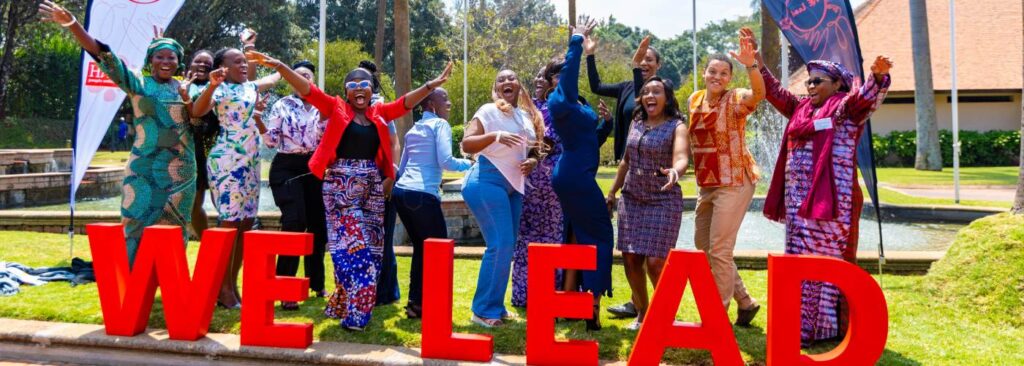”Women… phonetically pronounced as We-men,
Are hidden in annals of history as part of his-story.
What about her-story…
Voice rightsholders – Indigenous women, Young women, Elderly Women, Women with disability and Queer women,
Often their voices muted but their inner voice screaming
“I want to seat at the table…I would like to decide, to influence and get access to affluence. Be it in wealth or knowledge…
Our commitment, my commitment is to write history and include her-story to his-story naming it our-story.
Each for equal is the theme, but we can’t let it be solely defined by what society defines who a woman ought to be; instanced by discrimination and segregation…yet we perceive it as normal!.
Are you ready to challenge this? When is it the right time? How do we celebrate .the unsung ‘sheros’ amongst us?
Thank you for joining us here today, in acknowledging the dreams, desires, rights and power of a woman
Women, are powerful, are equal, we stand for each other…
I am woman, I am legend, I am equal.”
Poem by Ruth Kimani, inspired by Gee Twist Films
International Women’s Day (IWD) is a globally acclaimed celebration recognizing women’s achievements politically, economically and socially. But beyond this, it’s also a day of accelerating and championing women’s equality everywhere.
2020 is a special momentum for the women’s movement worldwide. This is not just because it represents a new decade for enabling a gender equal world, but reflecting on the Beijing 25th anniversary that echoed the voices of over 3,000 activists who fought for women’s strides and empowerment to be recognized as a human right.
While this year’s IWD celebrations took many strides: from the women’s march in Latin America to high level meetings in various parts of the world, Tanzania’s activists took a different turn. They chose to recognize unsung Sheroes whose acts of determination, courage and boldness have played a crucial role in shaping Tanzania’s society. These Sheroines drawn from the remotest parts of the country to the capital Dar es Salaam joined the rest of the world by adding a voice to share their stories, experiences and contribution to a gender equal world.
In an event held on 6 March 2020 in Dar es Salaam by Voice and the Embassy of the Netherlands, these feminists also added realities women face across different generations.
In her opening remarks, Lianne Houben, Deputy Head of Mission of the Netherlands Embassy honored unsung sheroes by echoing her country’s commitment towards contributing to equal rights and opportunities for women and girls worldwide.
‘’We recognize that gender equality is a human right which is essential for development,’’ she added.
Through a panel discussion moderated by Rebecca Gyumi, activists and Sheroines namely: Margaret Kenyi, Mariamu Kubelebe, Mohammed Basanga, Anna Meela and Aneth Gerana unveiled stark revelations of women in the informal sector, decried issues of unpaid care work and the harsh reality of women with disability in accessing work and adding a voice to societal issues.
Margaret Kenyi’s (founder of the Step by Step Learning centre) motivation in establishing a learning centre for children with disability was fueled by her frustration in getting a good school for her autistic daughter. Reflecting on the theme: #EachforEqual she painted a gender equal society as a culmination of everyone’s responsibility through action.
For Aneth Gerana, founder of FUWAVITA, women with disability face double discrimination when it comes to accessing equal opportunities in economic advancement. As the first woman with a hearing impairment to attain a Masters Degree from the University of Dar es Salaam, her journey was marked with difficulty in securing a job which gave her the resolve to establish FUWAVITA- a local CSO empowering women with disability through skills training to secure their livelihoods. She believes #EachforEqual means gender equity.
Anna Meela, a lawyer by profession and the Deputy National Coordinator of WiLDAF Tanzania, simply equates #EachforEqual to the right to accessing resources and opportunities freely without bias, stigma or discrimination.
Lastly, activists Mariamu Kubelebe and Mohammed Basanga stressed that women in the informal sector are paid far much less compared to their male counterparts. They questioned the systemic discrimination of women in the sector through unequal pay and maintained the need to value unpaid care as an equal contributor to the economy. Their interpretation of #EachforEqual is equal treatment, equal pay and equal representation of women across the informal sector.
The event culminated in a photo exhibition featuring the Golden line program (funded by the Netherlands embassy in Tanzania and executed by Solidaridad), which showcased powerful stories of women in the mines, and the Voice program’s photo stories of women in diverse settings.
About Voice
Voice is a Ministry of Foreign Affairs, Netherlands innovative grant facility jointly executed by Hivos and Oxfam Novib.



